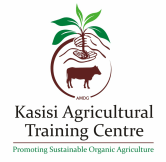Kasisi Agricultural Training Centre
 | |
| Abbreviation | KATC |
|---|---|
| Established | 1974 |
Region served | 10 km NE of Lusaka airport |
Director | Paul Desmarais, SJ |
Parent organization | Zambia-Malawi Jesuit Province |
| Affiliations | Jesuit, Catholic |
Staff |
25 professionals 50 support staff |
| Website |
KATC 2016 KATC 2007 |
Kasisi Agricultural Training Centre (KATC) was founded by the Jesuits of the Zambia-Malawi Province in 1974 near Lusaka, Zambia. Since 1990 it has trained farmers in sustainable organic agriculture while carrying on research, extension, and lobbying efforts. It has its own farm to defray expenses.
Vision and courses
KATC seeks to be a leader in the field of sustainable organic agriculture, preserving the environment. It teaches farming techniques that do not require fertilisers and pesticides and that save on water. It also addresses areas of rural development in general, including agricultural tools, housing, food and income security, and access to markets.
Courses are offered suitable for small-scale farmers, school teachers, extension workers, and community leaders.
Courses teach basic principles applicable to a variety of environments and economic and social contexts. All courses include hands-on training and a day spent on an operational farm. Issues such as HIV/AIDS, gender, GMOs, and climate change are always included. Trainees come from all three agro-ecological regions of Zambia and from neighboring countries.[1]
Courses Offered:
- Sustainable Agriculture
- Farm Management
- Agri-Business Management
- Agroforestry
- Animal Traction and Donkey Utilisation
- Beekeeping
- Blacksmithing
- Dairy and Pastures
- Internal Control Systems for Farmer Group Certification
- Organic Cotton Production
- Organic Vegetable Production
- Permaculture Design
- Study Circle Leadership
- Cooperative Formation and Management[2]
Other divisions
Research
KATC researches sustainable organic agriculture techniques, including indigenous, exotic, and new technologies. Collaborating partners include University of Zambia (UNZA); Mulungushi University (MU); Zambia Agricultural Research Institute (ZARI); University of Guelph, Canada; Edinburgh University, Scotland; James Hutton Institute, Scotland (JH); and Lancaster University, UK. KATC favors on-farm trials for ease of adoption by the farmers. Its research includes soil fertility and crop and livestock production; it also does social and marketing research. Some current projects include permaculture trial (with UZ), green manure trial, biochar trial (with UNZA, ZARI, and MU), impact of organic agriculture practices on soil fertility (with JH and Scottish Catholic Aid Fund), and organic resource management for soil fertility (with UNZA and FiBL). KATC also guides research by students from tertiary-level institutions.[3]
In order to effectively implement it's activities, KATC collaborates with additional local and international like-minded organisations and institutions, including: Government-Ministry of Agriculture and Live-stock, Ministry of Environment, Zambia Climate Change Network, Chongwe Organic Producers and Processor's Association, Organic Producer's and Processors's Association of Zambia, Participatory Ecological Land Use Management (PELUM).[4]
Extension
KATC makes follow-up visits to farmers who have studied at the Centre. Extension also maintains about 30 demonstration plots in Chongwe district annually, with field days around late February at each demonstration plot. KATC collaborates on radio programs with Christian Voice and ZNBC, and with Yatsani community radio since 2001.[5]
Production Unit
KATC has a commercial production unit to support practical training and income generation. The production unit includes dairy and ranch animals as well as rain-fed and irrigated crops. The production unit also produces and improves seed to ensure easy access to improved seed for small-scale farmers.[6]
Lobbying
KATC has successfully lobbied against the spread of GMOs into Zambia, and in favor of plant variety protection protocols. It has also worked with government to have SOA acknowledged in national documents. In June 2013 KATC played a key role in the introduction of the SOA crop science curriculum at UNZA.[7]
Ongoing projects
As of 2014, KATC has the following ongoing projects:
- Kulima - improved food security among rural households (with Scottish Catholic International Aid Fund)
- Conversion to Organic Agriculture by small-scale farmers (with Canadian International Development Agency)
- Food Security and Community Based Agro-biodiversity Management (funded by Norway development funds)
- Green Village Concept Project (funded by HiVOs[8])
- Developing Agricultural Value Chains (with INCLUVEST[9]).[10]
Organic commercial crops
Currently KACT grows the following commercial crops, certified organic by ECOCERT South Africa: barley, wheat, oats, soyabeans, sunflower, sunhemp, and open pollinated variety seed maize. It is planning to add to its organic produce: whole wheat, semolina, stone ground wheat, flour, whole grain oats (groats), rolled oats, stone ground oat flour, sunflower oil, soya bean oil, and fresh vegetables. Many other small-scale crops can be certified under contract.[11]
References
Coordinates: 15°16′11.13″S 28°28′19.93″E / 15.2697583°S 28.4722028°E